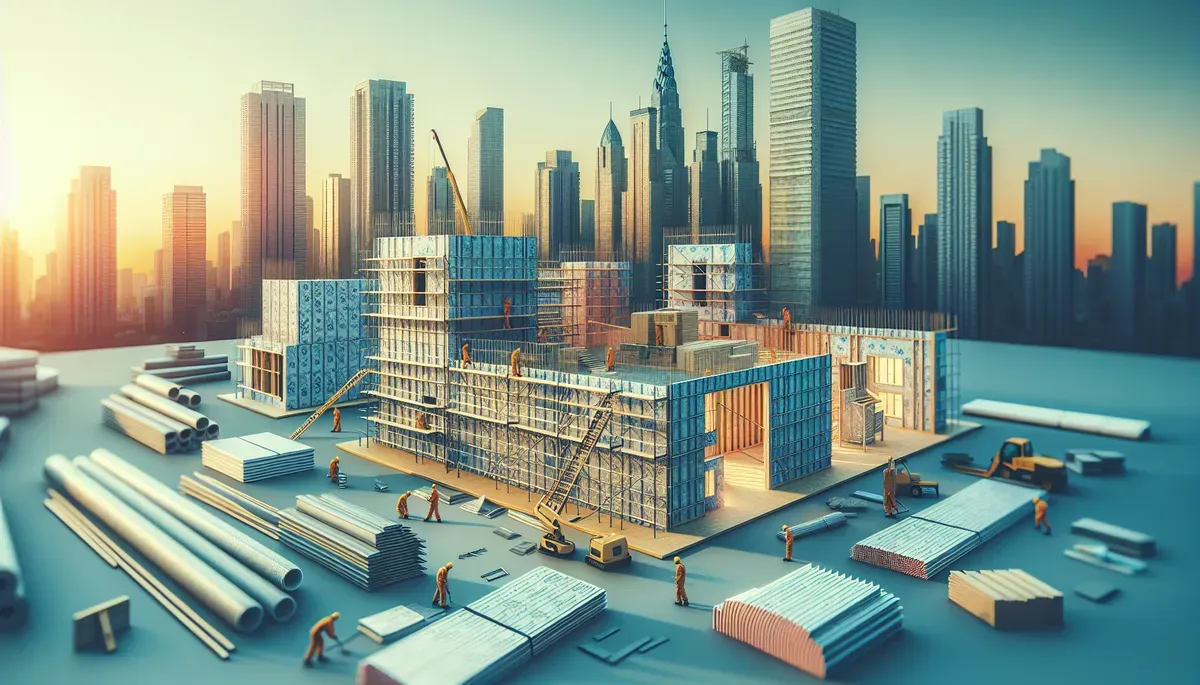Introduction
Energy efficiency has become a major priority in today’s construction and renovation projects. Rising energy costs and increased awareness of climate change have put pressure on both homeowners and businesses to adopt more sustainable practices. The demand for energy-efficient buildings has surged, not just to save money on utility bills but also to reduce environmental impact. As a result, selecting the right building materials has become essential for optimizing energy savings in both new constructions and retrofit projects.
In this article, we’ll explore some of the most effective building materials that can significantly improve energy efficiency. From insulation to roofing materials and advanced technologies, we’ll dive into the options available to help maximize energy savings in any building project. Whether you’re a contractor looking to improve your offerings or a homeowner planning your next renovation, this guide will provide you with the insights needed to make informed decisions about energy-efficient building materials.
Insulation Materials
Insulation plays a critical role in maintaining a building’s energy efficiency. It acts as a barrier to heat flow, keeping warm air inside during the winter and preventing it from entering during the summer. Without proper insulation, buildings are prone to significant energy loss, leading to higher heating and cooling costs. The right insulation material can make a massive difference in a building’s overall thermal performance, contributing to energy savings and occupant comfort.
Types of Insulation:
- Spray Foam Insulation: Spray foam insulation is one of the most effective materials for enhancing energy efficiency. Its primary benefits include superior thermal performance and its ability to seal air leaks in hard-to-reach areas. Unlike traditional insulation materials, spray foam expands on contact, filling every crevice to create an airtight seal. This helps prevent drafts, moisture infiltration, and heat loss, making it a popular choice for both residential and commercial applications. Additionally, spray foam provides excellent soundproofing and can strengthen the structure it is applied to. Learn more about how spray foam insulation can transform energy performance in our detailed guide, “How Spray Foam Insulation Enhances Energy Efficiency.“
- Rigid Panel Insulation: Rigid panel insulation, typically made from foam boards or fiber-reinforced materials, offers excellent thermal resistance. It is often used in walls, roofs, and floors where high-performance insulation is needed. Rigid panels provide consistent R-value (a measure of insulation efficiency) and are commonly installed in new builds or renovations to boost energy savings. These panels are lightweight, easy to install, and resistant to moisture, making them ideal for various climates and conditions. For a deeper dive into the benefits and applications of rigid panel insulation, check out our comprehensive guide, “Choosing the Best Rigid Panel Insulation for Your Project.“
Roofing Materials
Energy-Efficient Roofing: Roofing materials significantly impact a building’s energy efficiency, particularly regarding heat absorption and retention. Energy-efficient roofing options, such as cool roofs and reflective materials, can help reduce heat gain, lower cooling costs, and extend the lifespan of the roof. By reflecting sunlight instead of absorbing it, these roofing solutions can keep buildings cooler, reducing the need for air conditioning and minimizing energy consumption.
- Roofing Underlayment: The choice of roofing underlayment is crucial for maximizing the performance of the roofing system. Synthetic underlayment, for instance, is gaining popularity due to its durability and moisture resistance. It acts as an additional layer of protection against leaks and can enhance the energy efficiency of the roof by providing a better thermal barrier. This added layer can help prevent heat transfer, making it easier to maintain comfortable indoor temperatures. For an in-depth understanding of how to select the right roofing underlayment, read our article, “Choosing the Right Roofing Underlayment for Durability and Performance.“
Advanced Building Materials
Sustainable Materials: Sustainability is at the forefront of modern construction, and eco-friendly materials play a crucial role in enhancing energy efficiency. Options like bamboo flooring, reclaimed wood, and recycled steel not only reduce waste but also require less energy to produce. These materials are becoming increasingly popular among environmentally conscious builders and homeowners, as they contribute to a lower carbon footprint while providing durability and aesthetic appeal.
Innovative Technologies: Innovations in building technologies are transforming how energy efficiency is approached. Techniques such as passive solar design harness natural sunlight to heat and illuminate spaces, significantly reducing reliance on artificial lighting and heating systems. Advanced insulation products, smart glass, and energy-efficient windows are also key components in creating buildings that consume less energy and provide more comfort for occupants.
Explore the future of eco-friendly construction methods and their benefits in our guide on “Green Building Techniques and Their Impact on Energy Efficiency.“
Evaluating ROI
Cost-Benefit Analysis: When considering energy-efficient materials, it’s essential to evaluate the long-term return on investment (ROI). While energy-efficient products may have a higher upfront cost, the savings on energy bills often offset these expenses over time. Additionally, many energy-efficient materials qualify for government incentives and rebates, making them more financially viable for homeowners and businesses.
- Energy-efficient materials can significantly reduce heating and cooling costs, sometimes by 30% or more, leading to substantial savings over the lifespan of the building.
For a detailed analysis of potential savings and financial benefits, check out our article, “The Long-Term ROI of Energy-Efficient Building Products.“
Digital Marketing for Building Products
Importance of SEO: In today’s digital landscape, having a strong online presence is crucial for promoting energy-efficient building products. Search engine optimization (SEO) strategies can significantly improve visibility, helping manufacturers and distributors connect with potential customers. Effective keyword usage, high-quality content, and robust backlink strategies are key components in driving traffic to product pages.
- By optimizing product descriptions and providing valuable information through blogs and articles, businesses can position themselves as authorities in the building materials industry.
Discover actionable SEO strategies tailored for building products in our guide, “SEO Strategies for Promoting Building Products Online.“
Conclusion
In conclusion, maximizing energy efficiency through the careful selection of building materials is essential for modern construction and renovation projects. Insulation, roofing, sustainable materials, and innovative technologies all play critical roles in reducing energy consumption and enhancing occupant comfort. By understanding the benefits and applications of these materials, you can make informed choices that not only save money but also contribute to a more sustainable future.
For more in-depth information, don’t hesitate to explore the linked articles that provide further insights into specific topics discussed. Embracing energy-efficient building materials is not just a trend; it’s a commitment to creating better, more sustainable living and working environments for everyone.


